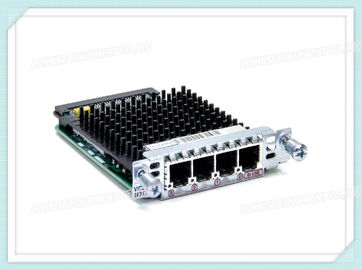Cisco IP Communications solutions provide the means for integrating voice and data allowing users to take advantage of services such as IP telephony, integrated services, and toll-bypass. These solutions allow enterprises, managed network service providers, and service providers to reap the advantages of Unified Communications such as lower operating costs and increased productivity. Cisco Unified Communications solutions also enable packet voice technologies including voice over IP (VoIP) (including H.323, Media Gateway Control Protocol (MGCP), and Sessions Initiation Protocol (SIP), voice over Frame, voice over ATM (including AAL2 and AAL5 adaptation layers).
The IP Communications High-Density Digital Voice/Fax Network Modules are an integral part of the Cisco Unified Communications offering, delivering a versatile combination of digital voice, analog voice, and data capabilities in a single network module form factor. They not only provide the IP telephony gateway to Cisco UC architectures for calls to and from the PSTN and the WAN, but also allow enterprises to deploy networks with existing traditional telephony equipment until they are ready to migrate to IP telephony. Features include high-density digital voice and WAN connectivity up to four T1/E1 ports, analog voice connectivity up to four ports, and up to 50 conferencing and transcoding sessions1. Enterprises can now deploy all these rich features on a single network module, enabling connectivity to the PSTN, traditional telephony equipment such as PBXs, key systems, analog telephones, fax machines, and the enterprise WAN.
This product supports three network module versions, with the option of zero, one, or two built-in T1/E1 ports, as shown in Table 2. Each built-in port can be conveniently software-configured to support either T1 or E1 operation. Each network module also supports a single VIC/VWIC slot that can be fitted with a Cisco voice/WAN interface card (VWIC) or voice interface card (VIC). The Cisco VICs are daughter cards that install into the network modules and provide the interface to the PSTN and to telephony equipment (PBXs, key systems, fax machines, phones). The Cisco VWICs are daughter cards that provide the interface to the PBX, PSTN, and/or WAN. Figure 1 shows a NM-HDV2-2T1/E1 with two built-in T1/E1 ports and a VIC3-2FXS/DID in the VIC/VWIC slot.
Cisco VWICs supported include 1- and 2-port T1 and E1 interface cards with optional drop-and-insert capability along with a G.703 interface card option. These cards cover a full range of digital voice and WAN connectivity options. A variety of VIC options are supported including 2-port foreign exchange station (FXS), direct inward dial (DID), foreign exchange office (FXO), E&M (ear and mouth) analog interface cards, 4-port FXS and 4-port FXO cards and a 2-port ISDN Basic Rate Interface (BRI) digital interface card providing -40V phantom power. These cards cover the entire range of analog connectivity options along with user-side and network-side digital BRI connections. Please see Table 3 below for details on options supported.
The IP Communications High-Density Digital Voice/Fax Network Modules are used with the PVDM2 Packet Fax/Voice DSP modules, providing scalability from 4 to 120 channels and featuring the latest digital signal processing technology. A maximum of four PVDM2s can be installed on each NM-HDV2 network module. The IP Communications High-Density Digital Voice/Fax Network Modules that are deployed on the Cisco 2811, 2821, 2851, 2911, 2921, 2951, 3825, 3845, 3925 and 3945 Unified Communications Routers can also be conveniently used with the onboard PVDM2 DSP modules (on the 2800 and 3800 Series only). The PVDM2s are not supported on the Cisco 2900 and 3900 Series motherboards. Enterprises can conveniently select the minimum number and density-type PVDM2s depending on the voice channels they are deploying, and scale the number of PVDMs as they expand. These PVDM2 can be configured for high-, medium- or flex complexity via software. Flex complexity is the default configuration, and in this mode, the network module will dynamically negotiate the appropriate codec (medium or high) on a call-by-call basis depending on the PVDM2s available.
Enhanced Cisco conferencing and transcoding features on the IP Communications High-Density Digital Voice/Fax Network Modules are available. The network modules provide a hardware-based conference resource at branch offices to facilitate multiparty conferences, thereby reducing the costs of delivering conferencing resources across the WAN. Transcoding resources within the same network module further reduces bandwidth consumption and costs by compressing traffic across the WAN, and enabling communications between devices that support different codecs. Up to 50 eight-party G.711 ad-hoc conferences, and up to 32 eight-party multicodec (G.711/G.729) ad-hoc conferences can be supported on a single IP Communications High-Density Digital Voice/Fax Network Module.
The IP Communications High-Density Digital Voice/Fax Network Modules are integrated in the Cisco 2811, 2821, 2851, 2911, 2931, 2951, 3825, 3845, 3925, and 3945 Unified Communications routers and are interoperable with the full range of Cisco IP Communications solutions-including Cisco IP phones, Cisco UCM, Cisco UCME, Cisco Unity software, Cisco Unity Express, Cisco IP Contact Center (IPCC), and Cisco IPCC Express. Up to four network modules can be configured in a Cisco 3845 and 3945 Unified Communications Router, supporting up to 480 and 720 voice channels in medium complexity codec on the Cisco 3845 and 3945, respectively. The IP Communications High-Density Digital Voice/Fax Network Module combined with Survivable Remote Site Telephony (operating with Cisco UCM) or Cisco UCME in a Unified Communications Router makes an ideal single-box communications solution for IP telephony in branch offices. Table 5 lists the maximum number of network modules that are supported on a Unified Communications Router.

 Your message must be between 20-3,000 characters!
Your message must be between 20-3,000 characters! Please check your E-mail!
Please check your E-mail!  Your message must be between 20-3,000 characters!
Your message must be between 20-3,000 characters! Please check your E-mail!
Please check your E-mail! 






